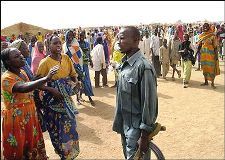UN says wants African monitors in Darfur camps
By Opheera McDoom
KHARTOUM, Sept 29 (Reuters) – African monitors should deploy in camps to help protect the almost 1.5 million people displaced by the conflict in Darfur and should also monitor police to help build trust with the local community, the United Nations said on Wednesday.
 Radhia Achouri, the U.N. advance mission spokeswoman in Khartoum, said the general security situation had not improved, with increased banditry a major concern for aid agencies working in the remote western region of Sudan.
Radhia Achouri, the U.N. advance mission spokeswoman in Khartoum, said the general security situation had not improved, with increased banditry a major concern for aid agencies working in the remote western region of Sudan.
The United Nations also noted several reported attacks by rebels on police and government military bases in the west during the past two weeks.
Achouri told reporters the United Nations was recommending “more effective proactive monitoring so that African Union monitors will be deployed on the ground in the IDP (internally displaced persons) camps.”
She said the United Nations wanted up to 5,000 AU monitors, a figure the U.N. special envoy to Sudan Jan Pronk has suggested would be needed, to act as a deterrent to attacks on the camps and help protect aid workers.
The monitors were originally to be deployed mainly in major towns, but under plans to expand their mandate the United Nations wants to spread their presence. The AU currently has 150 monitors and just over 300 troops to protect them in Darfur.
“We’d like the monitors also to monitor the police of Sudan,” she added, saying this could help lessen mistrust between the government and those affected by the fighting.
After years of skirmishes between Arab nomads and non-Arab farmers over scarce resources in arid Darfur, rebels took up arms in February 2003 accusing Khartoum of neglect.
The rebels have also accused Khartoum of supporting Arab militias, known as Janjaweed, to loot and burn non-Arab villages and drive them off their land. Khartoum denies the charge, calling the Janjaweed outlaws.
Rights groups also accuse pro-government militias of a systematic campaign of rape against non-Arab tribes in Darfur. Sudan denies any rape campaign.
Sudan’s council for human rights on Wednesday officially asked rights group Amnesty International to provide them with evidence of the 200 cases of rape in Darfur the group discovered during a recent trip to the west.
The Sudanese Media Centre, an agency close to the government, quoted a council member as saying the number of rape cases was not as high as 200, and the government commission to investigate rape in Darfur had found only 50 cases so far.
EXTRA FORCES
Achouri said the United Nations had not received a formal acceptance of the expanded number of troops from the government, because the number had yet to be specified. But the U.N. hoped to have the extra force on the ground by the end of October.
Achouri said the United Nations had only received 53 percent of the $365 million needed to deal with what it has described as the world’s worst humanitarian crisis.
A U.N. Security Council resolution threatens Sudan with possible sanctions if it fails to stop the violence in Darfur, which the United States has called genocide. A ceasefire agreed in Chad in April has proved shaky.
Asked about the current level of violence, Achouri said: “Our assessment so far is the security situation overall … did not improve but did not worsen.”
She said the AU was investigating reports of rebel attacks in the past few days, including one on a police station outside the huge Kalma camp, near the capital of South Darfur state on Sept. 25 in which two policemen were reported killed.
She added banditry had been hampering aid access and made some roads to dangerous to pass.
